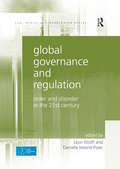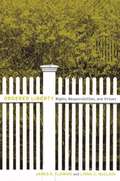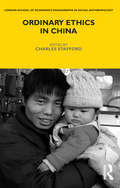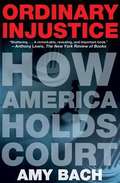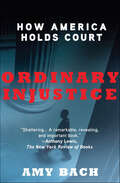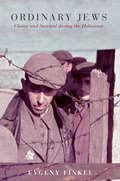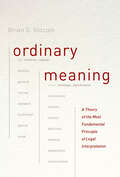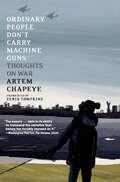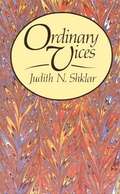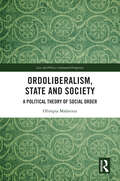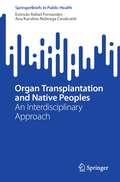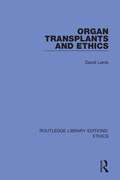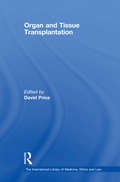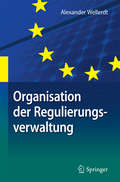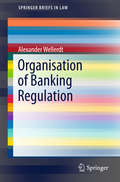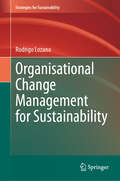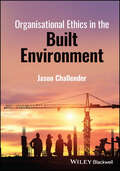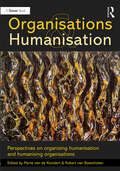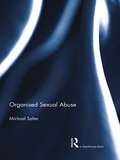- Table View
- List View
Order and Disorder in the 21st Century: Order and Disorder in the 21st Century (Law, Ethics and Governance)
by Danielle Ireland-Piper Leon WolffWith a diverse group of contributors from law, business and the social sciences, this book explores the line not only between order and disorder in global affairs, but also chaos and control, continuity and change, the core and the margins. The key themes include: global crises and the role of international law, norms and institutions; the challenge of pluralism to regulatory clarity; and critical assessments of taken-for-granted systems and values such as capitalism, centralised government, de-militarisation and the separation of powers. The book divides into two key parts. The first part, `Conceptions’, considers the diverse way in which order/disorder can be conceived in global governance and regulation. The second part, `Case Studies’, groups chapters around five topic areas: citizens, capitalism, conflict, crime and courts. The authors here build on the themes presented in the first part by embedding them within specific areas of international regulation, such as international criminal law, maritime law or finance regulation; jurisdictions and regions, such as Australia, Canada, China, Japan and South Asia; and subject-matter, such as water resources, citizenship, statelessness and public interest litigation. This blend of contemporary subject-matter, empirical studies, multi-disciplinary perspectives and academic theories provides a comprehensive analysis to current and emerging debates in the broader global community. In utilizing interdisciplinary studies to draw out common issues and alternative solutions, the book will appeal to a wide readership among academics and policy-makers.
Order within Anarchy
by James D. MorrowOrder within Anarchy focuses on how the laws of war create strategic expectations about how states and their soldiers will act during war, which can help produce restraint. The success of the laws of war depends on three related factors: compliance between warring states and between soldiers on the battlefield, and control of soldiers by their militaries. A statistical study of compliance of the laws of war during the twentieth century shows that joint ratification strengthens both compliance and reciprocity, compliance varies across issues with the scope for individual violations, and violations occur early in war. Close study of the treatment of prisoners of war during World Wars I and II demonstrates the difficulties posed by states' varied willingness to limit violence, a lack of clarity about what restraint means, and the practical problems of restraint on the battlefield.
Order without Law: How Neighbors Settle Disputes
by Robert EllicksonIn Order without Law, Robert Ellickson shows that law is far less important than is generally thought. He demonstrates that people largely govern themselves by means of informal rules—social norms—that develop without the aid of a state or other central coordinator. Integrating the latest scholarship in law, economics, sociology, game theory, and anthropology, Ellickson investigates the uncharted world within which order is successfully achieved without law. The springboard for Ellickson’s theory of norms is his close investigation of a variety of disputes arising from the damage created by escaped cattle in Shasta County, California. In “The Problem of Social Cost”—the most frequently cited article on law—economist Ronald H. Coase depicts farmers and ranchers as bargaining in the shadow of the law while resolving cattle-trespass disputes. Ellickson’s field study of this problem refutes many of the behavioral assumptions that underlie Coase’s vision, and will add realism to future efforts to apply economic analysis to law. Drawing examples from a wide variety of social contexts, including whaling grounds, photocopying centers, and landlord–tenant relations, Ellickson explores the interaction between informal and legal rules and the usual domains in which these competing systems are employed. Order without Law firmly grounds its analysis in real-world events, while building a broad theory of how people cooperate to mutual advantage.
Ordered Liberty: Rights, Responsibilities, and Virtues
by Linda C. Mcclain James E. FlemingMany have argued in recent years that the U. S. constitutional system exalts individual rights over responsibilities, virtues, and the common good. Answering the charges against liberal theories of rights, James Fleming and Linda McClain develop and defend a civic liberalism that takes responsibilities and virtues-as well as rights-seriously. They provide an account of ordered liberty that protects basic liberties stringently, but not absolutely, and permits government to encourage responsibility and inculcate civic virtues without sacrificing personal autonomy to collective determination. The battle over same-sex marriage is one of many current controversies the authors use to defend their understanding of the relationship among rights, responsibilities, and virtues. Against accusations that same-sex marriage severs the rights of marriage from responsible sexuality, procreation, and parenthood, they argue that same-sex couples seek the same rights, responsibilities, and goods of civil marriage that opposite-sex couples pursue. Securing their right to marry respects individual autonomy while also promoting moral goods and virtues. Other issues to which they apply their idea of civic liberalism include reproductive freedom, the proper roles and regulation of civil society and the family, the education of children, and clashes between First Amendment freedoms (of association and religion) and antidiscrimination law. Articulating common ground between liberalism and its critics, Fleming and McClain develop an account of responsibilities and virtues that appreciates the value of diversity in our morally pluralistic constitutional democracy.
Ordinary Ethics in China (LSE Monographs on Social Anthropology)
by Charles StaffordDrawing on a wide range of anthropological case studies, this book focuses on ordinary ethics in contemporary China. The book examines the kinds of moral and ethical issues that emerge (sometimes almost unnoticed) in the flow of everyday life in Chinese communities.How are schoolchildren judged to be good or bad by their teachers and their peers - and how should a 'bad' student be dealt with? What exactly do children owe their parents, and how should this debt be repaid? Is it morally acceptable to be jealous if one's neighbours suddenly become rich? Should the wrongs of the past be forgotten, e.g. in the interests of communal harmony, or should they be dealt with now?In the case of China, such questions have obviously been shaped by the historical contexts against which they have been posed, and by the weight of various Chinese traditions. But this book approaches them on a human scale. More specifically, it approaches them from an anthropological perspective, based on participation in the flow of everyday life during ethnographic fieldwork in Chinese communities.
Ordinary Injustice: How America Holds Court
by Amy BachAttorney and journalist Amy Bach spent eight years investigating the widespread courtroom failures that each day upend lives across America. What she found was an assembly-line approach to justice: a system that rewards mediocre advocacy, bypasses due process, and shortchanges both defendants and victims to keep the court calendar moving. <P><P> Here is the public defender who pleads most of his clients guilty with scant knowledge about their circumstances; the judge who sets outrageous bail for negligible crimes; the prosecutor who habitually declines to pursue significant cases; the court that works together to achieve a wrongful conviction. <P><P>Going beyond the usual explanations of bad apples and meager funding, Ordinary Injustice reveals a clubby legal culture of compromise, and shows the tragic consequences that result when communities mistake the rules that lawyers play by for the rule of law. It is time, Bach argues, to institute a new method of checks and balances that will make injustice visible—the first and necessary step to reform.
Ordinary Injustice: How America Holds Court
by Amy Bach"A groundbreaking book . . . revealing the systemic, everyday problems in our courts that must be addressed if justice is truly to be served."—Doris Kearns GoodwinAttorney and journalist Amy Bach spent eight years investigating the widespread courtroom failures that each day upend lives across America. What she found was an assembly-line approach to justice: a system that rewards mediocre advocacy, bypasses due process, and shortchanges both defendants and victims to keep the court calendar moving. Here is the public defender who pleads most of his clients guilty with scant knowledge about their circumstances; the judge who sets outrageous bail for negligible crimes; the prosecutor who habitually declines to pursue significant cases; the court that works together to achieve a wrongful conviction. Going beyond the usual explanations of bad apples and meager funding, Ordinary Injustice reveals a clubby legal culture of compromise, and shows the tragic consequences that result when communities mistake the rules that lawyers play by for the rule of law. It is time, Bach argues, to institute a new method of checks and balances that will make injustice visible—the first and necessary step to reform.
Ordinary Jews: Choice and Survival during the Holocaust
by Evgeny FinkelFocusing on the choices and actions of Jews during the Holocaust, Ordinary Jews examines the different patterns of behavior of civilians targeted by mass violence. Relying on rich archival material and hundreds of survivors' testimonies, Evgeny Finkel presents a new framework for understanding the survival strategies in which Jews engaged: cooperation and collaboration, coping and compliance, evasion, and resistance. Finkel compares Jews' behavior in three Jewish ghettos—Minsk, Kraków, and Białystok—and shows that Jews' responses to Nazi genocide varied based on their experiences with prewar policies that either promoted or discouraged their integration into non-Jewish society. Finkel demonstrates that while possible survival strategies were the same for everyone, individuals' choices varied across and within communities. In more cohesive and robust Jewish communities, coping—confronting the danger and trying to survive without leaving—was more organized and successful, while collaboration with the Nazis and attempts to escape the ghetto were minimal. In more heterogeneous Jewish communities, collaboration with the Nazis was more pervasive, while coping was disorganized. In localities with a history of peaceful interethnic relations, evasion was more widespread than in places where interethnic relations were hostile. State repression before WWII, to which local communities were subject, determined the viability of anti-Nazi Jewish resistance.Exploring the critical influences shaping the decisions made by Jews in Nazi-occupied eastern Europe, Ordinary Jews sheds new light on the dynamics of collective violence and genocide.
Ordinary Meaning: A Theory of the Most Fundamental Principle of Legal Interpretation
by Brian G. SlocumConsider this court case: a defendant has traded a gun for drugs, and there is a criminal sentencing provision that stipulates an enhanced punishment if the defendant "uses" a firearm "during and in relation to a drug trafficking crime." Buying the drugs was obviously a crime--but can it be said that the defendant actually "used" the gun during the crime? This sort of question is at the heart of legal interpretation. Legal interpretation is built around one key question: by what standard should legal texts be interpreted? The traditional doctrine is that words should be given their "ordinary meaning": words in legal texts should be interpreted in light of accepted standards of communication. Yet often, courts fail to properly consider context, refer to unsuitable dictionary definitions, or otherwise misconceive how the ordinary meaning of words should be determined. In this book, Brian Slocum builds his argument for a new method of interpretation by asking glaring, yet largely ignored, questions. What makes one particular meaning the "ordinary" one, and how exactly do courts conceptualize the elements of ordinary meaning? Ordinary Meaning provides a much-needed, revised framework, boldly instructing those involved with the law in how the components of ordinary meaning should properly be identified and developed in our modern legal system.
Ordinary People Don't Carry Machine Guns: Thoughts on War
by Artem ChapeyeA reporter and novelist who is also a soldier in the Ukrainian army reconsiders his pacifism and the choices one makes when war is waged against you."Chapeye represents a modern-day Ukrainian counterpart to classic American writers like Mark Twain or O. Henry, capturing the dignity and respect his characters might not get but nonetheless long for and deserve." —Kate Tsurkan, Los Angeles Review of BooksIn Ordinary People Don't Carry Machine Guns, Artem Chapeye reveals his war, intimate and senseless, withholding nothing about his motivations, his nightmares, his new relationship with the world. Here one man, a pacifist turned fighter, a story writer turned soldier, a father and husband, considers the reasons for and reactions to war on a very personal level.An avowed pacifist until 2022, Chapeye joined the Ukrainian army in the first days of the Russian invasion. He tries to understand the large-scale decision-making that has a defining impact on both individual citizens and society-at-large: many of his fellow soldiers never considered enlisting before finding themselves at war; others flee the country. He wonders from the front lines what his young children at home are doing and what they&’re feeling.The book is written in three parts, offering historical analogies and literary references throughout.&“When Darkness Comes&” relates the first days of the full-scale invasion in February 2022 when lives and the peace were shattered.&“It&’s Necessary to Cultivate Your Garden&” details the experience of the everyday people of Ukraine, workers and peasants, who look forward to returning to simpler lives.The last section, &“People Aren&’t Divided into Brands,&” critiques the elitism of those who consider themselves above those who &“simply&” fight.Deeply thought-provoking, intelligent, and heartbreaking, this is an essential book for anyone who wants to understand the ways that war can change everything.
Ordinary Vices
by Judith N. ShklarThe seven deadly sins of Christianity represent the abysses of character, whereas Shklar's "ordinary vices"--cruelty, hypocrisy, snobbery, betrayal, and misanthropy--are merely treacherous shoals, flawing our characters with mean-spiritedness and inhumanity. Shklar draws from a brilliant array of writers--Moliere and Dickens on hypocrisy, Jane Austen on snobbery, Shakespeare and Montesquieu on misanthropy, Hawthorne and Nietzsche on cruelty, Conrad and Faulkner on betrayal--to reveal the nature and effects of the vices. She examines their destructive effects, the ambiguities of the moral problems they pose to the liberal ethos, and their implications for government and citizens: liberalism is a difficult and challenging doctrine that demands a tolerance of contradiction, complexity, and the risks of freedom.
Ordnungswidrigkeiten in Rundfunk und Telemedien
by Roland Bornemann Steffen RittigDas Rechtshandbuch stellt die Ahndung und Verfolgung von Ordnungswidrigkeiten in Online-Medien (Rundfunk und Telemedien) mit ihren Besonderheiten dar. Es konzentriert sich auf die Gesichtspunkte, die in der Praxis eine Rolle spielen. Damit versetzt es Leser in die Lage, einen durchschnittlichen Alltagsfall im rundfunkrechtlichen Bußgeldverfahren ohne weitere Spezialliteratur zu lösen. Das Werk ist unverzichtbar für die Compliance bei privaten Rundfunkveranstaltern, Anbietern von rundfunkähnlichen Telemedien, Medienplattformen, Benutzeroberflächen, Medienintermediären und sonstigen Telemedien. Es wendet sich zudem an Studierende mit medienrechtlichem Studienschwerpunkt, an Landesmedienanstalten als nach §§ 35, 36 OWiG zuständige Verwaltungsbehörden sowie an Staatsanwaltschaften und Strafgerichte, aber ebenso und nicht zuletzt an die Verteidigerinnen und Verteidiger im Bußgeldverfahren.
Ordoliberalism, State and Society: A Political Theory of Social Order (Law and Politics)
by Olimpia MalatestaThis book provides a new interpretation of ordoliberalism – the influential German version of neoliberalism – by exploring the political, legal and social context of its emergence.Ordoliberal scholars regarded sociology, juridical science and economics as concrete policy-making instruments designed to discipline the structural conflicts of modern society. For, in their view, society should not impinge on the economy. Ordoliberalism is here presented as a political theory of social order, developing out of the crisis of the Weimar Republic and which has proven to be one of the most influential neoliberal accounts of social organization after WWII. Assessing the influence that leading German intellectuals such as Sombart, Schmoller, Savigny and Schmitt have exerted on ordoliberalism, this book provides an in-depth analysis of the social, legal and political theory of Walter Eucken, Franz Böhm, Alfred Müller-Armack, Wilhelm Röpke and Alexander Rüstow. In so doing, the book offers an invaluable study of the ideological roots of the notion of an economic constitution and a political–theoretical analysis of one of the first articulations of authoritarian liberalism at the European level.This book will appeal to scholars and students of legal, social, political and economic theory.
Organ Transplantation and Native Peoples: An Interdisciplinary Approach (SpringerBriefs in Public Health)
by Estevão Rafael Fernandes Ana Karoline Nobrega CavalcantiThis book presents important concepts from medical and socio-cultural anthropology to health professionals working with organ transplantation involving indigenous populations. Written by an anthropologist and a nephrologist working at the Brazilian Amazon region, it presents an interdisciplinary approach merging perspectives from medical and socio-cultural anthropology, social epidemiology and clinical medicine to blend philosophical concerns around tissue and organ exchange with transplant-related initiatives in order to help health professionals develop care protocols that take into account the specific cultures of indigenous populations.The approach proposed in this book is based on the assumption that there are other concepts of bodies, personhood, health, sickness, and collectivity implicated in processes of organ transplantation and health care in general that must be taken into consideration beyond strictly biomedical perspectives. Such cultural aspects also imply challenges in terms of bioethics and legislation, given the need to respect indigenous cultures. So, in order to offer health professionals practical insights, the book presents a review of the literature available about experiences of organ transplantation in ethnically diverse countries and how the professionals involved have addressed this diversity respecting these groups from a cultural, ethical, and epidemiological point of view. Organ Transplantation and Native Peoples: An Interdisciplinary Approach is primarily aimed at being a practical tool for health professionals working with indigenous populations, but will also be of interest to researchers in different fields of the social and health sciences, such as medical anthropology, public health, nursing, bioethics and epidemiology.
Organ Transplants and Ethics
by David LambOriginally published in 1990, this study of the moral problems bound up with transplant therapy addresses a finely balanced distinction between ethical issues relating to its experimental nature on the one hand and those which arise when transplantation is routine on the other. Among the issues examined are proposals for routine cadaveric harvesting, criteria for organ and tissue procurement from living donors, foetuses, non-human animals and current ethical problems with artificial implants. Written as a contribution to practical philosophy, this book will interest ethicists and health care professionals.
Organ and Tissue Transplantation (The International Library of Medicine, Ethics and Law)
by David PriceOrgan transplantation has been one of the miracles of modern-day medicine but, in addition to presenting enormous technical and clinical challenges, it throws up major ethical and legal issues principally from the perspective of the donor. Evolving capabilities in the spheres of both organ and tissue transplantation, coupled with rapidly-escalating demand, assert consistent and critical pressure on our ethical and legal principles and frameworks, including the expansion of the potential donor pool beyond the conventional categories of donor. This volume brings together seminal papers analyzing such matters in the context of an ever-increasingly important area of clinical practice.
Organisation der Regulierungsverwaltung: Am Beispiel Der Deutschen Und Unionalen Energieverwaltung
by Alexander WellerdtDieses Buch enthält eine detailreiche Untersuchung von Handlungsformen und Entscheidungsverfahren deutscher und europäischer Regulierungsakteure im Energiebinnenmarkt. Ausgehend von der Bundesnetzagentur wird insbesondere die Zusammenarbeit mit anderen nationalen Regulierungsbehörden, der Agency for the Cooperation of Energy Regulators (ACER) und der Europäischen Kommission hinsichtlich Organisation und Verfahren herausgearbeitet. Anhand einer wissenschaftlichen Einordnung der Praxisinstrumente nach Handlungsformen, Rechtswirkungen und Rechtsschutzintensität werden Modelltypen entwickelt, die das Zusammenspiel von Organisationsformen und Entscheidungsverfahren im europäischen Regulierungsverbund aufzeigen. Dieses Buch deckt Spannungen im europäischen Energiebinnenmarkt auf, indem es sich nicht auf die Feststellung rechtlicher Unstimmigkeiten im Regulierungsverbund beschränkt, sondern aktuelle Praxisprobleme aufgreift und zukünftige Entwicklungen durch das Vierte Energiebinnenmarktpaket antizipiert.
Organisation of Banking Regulation
by Alexander WellerdtThis book illustrates the interaction of banking regulators and discusses with it related legal and economic challenges. First, the importance of administrative organisations for the implementation of regulatory law towards banks and financial institutions is shown. On this basis five model types of administrative organisations in the field of banking regulation are derived. Thereby, banking regulators can be classified due to their influence on regulatory decisions. Their influence runs from preparation across enforcement to control of regulatory decisions. In particular, the cooperation of the European Central Bank with national banking regulators is analysed. Finally, the main legal and economic arguments of Banking Regulation in the Economic and Monetary Union are discussed.
Organisational Change Management for Sustainability (Strategies for Sustainability)
by Rodrigo LozanoThis book is aimed at providing clarity through a systemic and systematic approach to organisational change management for sustainability. Chapter 2 of the provides an overview of sustainable development and sustainability discourses, focussing on the economic, environmental, social, and time dimensions, as well as their interactions. Chapter 3 explains what organisations are, the types of organisations (civil society, corporations, education, public sector, and hybrid), the levels and system elements (individuals, groups, organisation, and system), attitudes (informational, emotional, and behavioural), the stakeholders that affect and are affected by the organisation, and the interactions between organisations (from competition to collaboration). Chapter 4 focuses on how organisations have been addressing sustainability, divided into 1) efforts to contribute to sustainability (i.e. focussing outside the organisation), and 2) engagement efforts (i.e. those focussing inside the organisation, e.g. through the use of tools, initiatives, and approaches for sustainability, and collaboration). Chapter 5 discusses change, types of change (internal vs. external, proactive vs. reactive, etc.), change strategies, change frameworks, and change for sustainability in organisations. Chapter 6 focusses on three key mechanisms for sustainability: Leadership, Governance, and Assessment and reporting (with examples from Higher Education Institutions, corporations, and public sector organisations). Chapter 7 discusses on the different drivers (internal, connecting, and external) that foster sustainability in organisations. Examples from empirical research are presented. Chapter 8 delves into resistance to change, particularly on the barriers that slow down or stop sustainability in organisations, as well as the strategies to overcome the barriers to change. Examples from empirical research are presented. The seventh chapter focuses on the different strategies that help reduce or eliminate resistance to sustainability in organisations. Examples from empirical research are presented. Chapter 9 focusses on where sustainability efforts have started (incorporation) and how have they been adopted throughout the organisation (institutionalisation). Examples from empirical research are presented. Chapter 10 presents the effects of external stimuli, such as COVID-19 on organisational change management for sustainability.
Organisational Ethics in the Built Environment
by Jason ChallenderOrganisational Ethics in the Built Environment A comprehensive analysis of the critical role played by ethics in construction organisations, and a toolkit for implementing a strong ethical culture In Organisational Ethics in the Built Environment, accomplished construction leader Jason Challender delivers an insightful and important resource for construction industry professionals contributing to the creation of safe and suitable projects. The author explains how to construct the foundation for ethical building and business practices in the construction industry, and explores the methods, motives and rationales behind successful and ethical projects from an organisational and industry perspective. You’ll learn how practical improvements to organisational ethics can promote ethical standards, behaviours and practices and influence the success of projects in the built environment. You’ll also discover the importance of leadership, motivational management, human resource management, corporate responsibility and social value in encouraging strict compliance and adherence to ethical principles, values and standards within organisations. Readers will also find: A thorough introduction to the critical importance of trust, collaborative working and partnering arrangements in contemporary construction and engineering organisations Comprehensive explorations of the relevance of environmental ethics Practical discussions of how to link corporate policies and strategies to ethical guidelines Case studies from across a variety of knowledge fields, including manufacturing and retail Perfect for construction managers, Organisational Ethics in the Built Environment will also benefit undergraduate and postgraduate students of construction, business, management, engineering and other construction related subjects.
Organisationale Machtbeziehungen im Wandel: Führung zwischen Zustimmung und Zwang
by Olaf Geramanis Stefan Hutmacher Lukas WalserDieses Fachbuch beschreibt mit seiner interdisziplinären Ausrichtung die Machtbeziehungen in Organisationen aus mehreren Blickwinkeln. Die Autoren untersuchen das Spannungsverhältnis zwischen klassischen Strukturen und Bedingungen auf der einen und einer eher diffusen Handlungs- und Gestaltungsmacht auf der anderen Seite. Dabei gehen Sie den Fragen nach, ob aktuell Veränderungen von Machtbeziehungen in Organisationen stattfinden und welcher Art diese sind bzw. welche Auswirkungen sie haben. Wie gehen Führende mit den Herausforderungen einer sich verändernden Welt um und welche machtdynamischen Folgen können sich daraus entwickeln? Wo sind möglicherweise Schwachstellen im Machtgefüge innerhalb einer Organisation und wie kann mit Ambivalenzen und Machtverschiebungen aufgrund sozialer und technischer Veränderungen umgegangen werden? Es wird deutlich, dass Machtausübung zwar asymmetrisch ist, aber keineswegs etwas Einseitiges – Machtbeziehungen sind Austauschbeziehungen.Die Hochschule für Soziale Arbeit der Fachhochschule Nordwestschweiz unterstützte diesen Tagungsband.
Organisationale Spannungen und Paradoxien in radikal selbst organisierten Unternehmen
by Elsa BreitHeutzutage sind Unternehmen von sehr volatilen Umweltbedingungen umgeben. Um auf diese adäquat reagieren zu können, arbeiten einige Pioniere radikal selbst organisiert mit Organisationsformen wie Holakratie und Soziokratie Bei radikaler Selbstorganisation wird Autorität formal und organisationsweit an die Mitarbeitenden übertragen. Elsa Breit untersucht in diesem Buch, welche organisationalen Spannungen und Paradoxien bei der Transformation hin zu radikaler Selbstorganisation auftreten, wie Unternehmen mit diesen umgehen und zu welchen Auswirkungen separierende und integrierende Ansätze führen. Dazu untersucht sie zwei holakratisch organisierte Unternehmen empirisch in den Spannungsfeldern Lernen, Organisation, Handlungsfähigkeit, Macht und Leistung. Der Paradoxie „Lerne Fremdorganisation, um selbst organisiert zu sein“ kann beispielweise durch intensives Training für Mitarbeitende und Begleitung durch Coaches begegnet werden. Elsa Breit zeigt mit ihrer Forschung, dass bei einer Integration von Paradoxien mit einer Sowohl-als-auch-Strategie positive Kreisläufe der Selbstorganisation und -verantwortung, Entwicklung von Rollen und Kreisen zur Anpassung an Umweltbedingungen, Spannungsverarbeitung und damit Komplexitätsbewältigung und Mitarbeiterzufriedenheit eintreten können. Radikale Selbstorganisation in Verbindung mit paradoxem Denken, nachhaltigem Unternehmenszweck, verteiltem Eigentum hat außerdem großes Potential für nachhaltiges und demokratisches Wirtschaften.
Organisations and Humanisation: Perspectives on organising humanisation and humanising organisations
by Myrte van de Klundert Robert Van BoeschotenThe term humanisation was introduced in humanistic studies to develop a humanist way of thinking about organisations and human relations. It stems from a need to think about questions of justice and living a good life in practice but not from some absolute or abstract point of view. As it is often framed, humanisation is concerned with working towards a more human type of organisation. Organisation studies are concerned with understanding organisations and their role in our society, and developing perspectives and methods to improve them, while humanisation theories, on the other hand, do not represent a managerial blueprint as they tend to incorporate notions of situated knowledge, sense-making and relational value, drawing our attention to specific processes rather than offering universal truths. Although Critical Management Studies counters mainstream managerialism, it still tends to produce the same kind of ‘truths’ that are supposed to apply to all organisations. Much of the existing management literature is related to control and offers strategies on how to do things but this is not about prescriptions, rather how to explore possibilities from both theoretical and practical perspectives. It offers managers as well as theoreticians of organisations the possibility to question their grounding principles. In the variety of contributions to this book the authors reflect on their understanding of what it is to be human and whether this can be found in the way that organisations are run. They consider the value of humanisation to understand and intervene in organisations and the challenges they face.
Organisationsentwicklung im Spiegel der Natur: Von Bäumen für erfolgreiches und nachhaltiges Management lernen
by Ursula SchullerusMit diesem Buch möchte die Autorin Führungskräfte und Mitarbeitende anregen, von der Natur und ihren Kräften zu lernen, wie Unternehmen nachhaltiger gestaltet werden können. In der Natur gibt es viele Gesetzmäßigkeiten und Zusammenhänge, die sich auch in Unternehmen wiederfinden. Mit Fachwissen und treffenden Fragen greift Ursula Schullerus diese Zusammenhänge auf und beschreibt Möglichkeiten, die Erkenntnisse in den Alltag und die Unternehmenspraxis zu übertragen. Als Modell dient der Baum, der in einem Transformationsprozess Früchte produziert. Ein nachhaltiges Modell, das funktioniert, weil der Baum fest verankert ist, vernetzt kommuniziert, gegensätzliche Strukturen braucht, um gleichzeitig flexibel und stabil zu sein. Ausgehend von dem Zusammenspiel von Wurzel, Stamm und Krone fragt die Autorin: Was brauchen Organisationen, um ähnlich nachhaltig zu agieren? Wodurch entsteht die innovative Triebkraft? Welche Denkmuster sind notwendig, um im Prozess der digitalen Vernetzung eine Verankerung zu halten? Welche Kompetenzen sind notwendig, um die Dynamik sich wandelnder Strukturen und Prozesse zu steuern? Was gibt Mitarbeitenden Orientierung? Ursula Schullerus liefert kein fertiges Konzept. Ihre Absicht ist, dass Leser durch Fragen eigene Lösungen finden, die zu ihrer Organisation und deren Kontext passen. .
Organised Sexual Abuse
by Michael SalterOrganised Sexual Abuse offers a comprehensive, interdisciplinary investigation of this phenomenon. Since the early 1980s, social workers and mental health professionals around the globe have encountered clients reporting sexual abuse by organized groups or networks. These allegations have been amongst the most controversial in debates over child sexual abuse, raising many unanswered questions. Are reports of organized abuse factual or the product of moral panic and false memories? If these reports are true, what is the appropriate response? The fields of child protection and psychotherapy have been polarised over the issue. And, although cases of organized abuse continue to be uncovered, a reasoned and evidence-based analysis of the subject is long overdue. Examining the existing evidence, and supplementing it with further qualitative research, in this book Michael Salter addresses: the relationship between sexual abuse and organized abuse; questions over the veracity of testimony; the gap between the policing response to sexual abuse and the realities of child sexual exploitation; the contexts in which sexually abusive groups develop and operate; the role of religion and ritual in subcultures of multi-perpetrator sexual abuse; as well as the experience of adults and children with histories of organized abuse in the criminal justice system and health system. Organized Sexual Abuse thus provides a definitive analysis that will be of immense value to those with professional and academic interests in this area.
